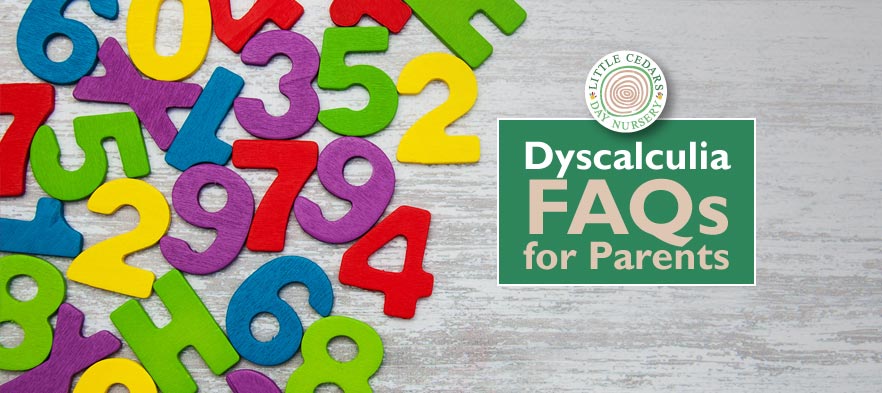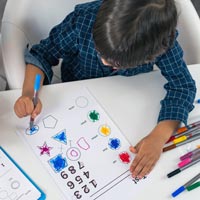
 In today’s guide, we answer frequently asked questions (FAQs) about Dyscalculia, particularly in relation to children, including preschoolers. Around 5% of children of school age are thought to have dyscalculia.
In today’s guide, we answer frequently asked questions (FAQs) about Dyscalculia, particularly in relation to children, including preschoolers. Around 5% of children of school age are thought to have dyscalculia.
Isn’t Dyscalculia like Dyslexia, but for Numbers?
Not really. Both conditions can make learning maths tricky, but they are quite different. Learn more about dyslexia here, or read on to learn about dyscalculia.
Bill Gates, founder of Microsoft, has dyscalculia. So do pop stars Robbie Williams and Cher. Even Benjamin Franklin had the condition.
What is Dyscalculia?
Put simply, dyscalculia is a difficulty in understanding numbers. Indeed, it’s sometimes referred to as an arithmetic-related learning disability. Research into it is currently only at an early stage. People suffering from the condition will find all mathematical activities troublesome. Even concepts like whether a number is larger or smaller than another may be difficult to comprehend, so even more advanced mathematical concepts will be very difficult for sufferers to grasp. As with dyslexia, the condition can afflict people of any level of intelligence. However, there are thought to be possible links between dyscalculia and Asperger’s Syndrome or even Autism in some cases. Those with ADHD are also often prone to learning disorders like dyscalculia.
What are the Signs/Symptoms of Dyscalculia?
 A few of the possible signs of dyscalculia include:
A few of the possible signs of dyscalculia include:
-
- Difficulty understanding numbers and in acquiring mathematical skills;
- Difficulty manipulating and comparing numbers and quantities;
- Difficulty remembering number facts and procedures;
- At pre-school age, children may have difficulty grasping the link between number symbol “4” and the word “four”;
- They may also be unable to connect the number to the same quantity of objects;
- Preschoolers may even be unable to grasp the concept of counting, what it all means and how it applies to everyday objects and scenarios;
- They may also be unable to reliably count in the correct order, without error;
- Once they start school, children with dyscalculia may have difficulty with simple addition, subtraction, division, multiplication, number facts and even mathematical symbols like + and -;
- Graphs and charts based on numbers may seem meaningless to them;
 They may also continue to use fingers to count long after their contemporaries have moved on to mental counting;
They may also continue to use fingers to count long after their contemporaries have moved on to mental counting;- Dyscalculia can manifest itself in games, for example draughts and chess. A sense of direction and the planning of moves may not come naturally;
- Even simple keeping of score during sports games like cricket, netball or football may be troublesome;
- Later on, money management may also be a problem;
- Older children who are aware that they have the condition may become anxious about attempting any mathematical problem. This could even turn into phobia around going to school and diminished self-confidence;
- It’s also worth noting that many people who have dyscalculia may also have problems with their memory;
- The condition may also adversely affect how well the brain and eyes work together. This can make coordination and judging of distances more difficult.
Please note: with all the possible symptoms mentioned in this guide, having symptoms does not necessarily prove the existence of the condition. It’s therefore important not to jump to conclusions without proper, professional, appraisal. It is crucial to ensure that the problem is not caused by something entirely different, for example poor eyesight or hearing. For this reason, an appraisal and any guidance from a doctor, educational psychologist and/or paediatrician would be wise. Although various tests and commercial appraisal services exist, it’s important to understand that no watertight test for dyscalculia has yet been developed.
Is there a Cure for the Condition?
 Just as with dyslexia, there is no cure for dyscalculia. However, there are many ways to help children cope with its effects. It’s also worth bearing in mind that children with dyscalculia can be very gifted in other areas, for example creativity, strategic thinking, problem solving, practical abilities and often great intuition.
Just as with dyslexia, there is no cure for dyscalculia. However, there are many ways to help children cope with its effects. It’s also worth bearing in mind that children with dyscalculia can be very gifted in other areas, for example creativity, strategic thinking, problem solving, practical abilities and often great intuition.
How Can Children with Dyscalculia be Helped?
There are several ways in which parents, carers, teachers and early years professionals can help children overcome the limitations of dyscalculia:
- Using small objects (e.g. counters etc.) can help to demonstrate how numbers work and are applied;
- Practise can build up mathematics confidence;
- Giving a child with dyscalculia extra time for any task involving numbers and maths can also help;
- Break larger numerical tasks down into a series of smaller steps;
- Ensure affected children have ample access to visible reference such as number charts, multiplication tables, formulae when their older, etc.;
- Calculators will also help when not testing mental or written arithmetic;
- Children with dyscalculia may also benefit from the use of graph paper, which will allow them to more confidently line up numbers and calculation steps;
 They can also benefit when important words and numbers are highlighted (to draw attention to their importance);
They can also benefit when important words and numbers are highlighted (to draw attention to their importance);- Children with dyscalculia will also benefit from an early view of a new topic or concept. ‘Pre-teaching’, in other words;
- One-to-one teaching will be helpful so that concepts are given deeper explanation and repeated demonstration where needed;
- Specific teaching strategies may also be required, including possible multi-sensory solutions;
- Physical and software tools may also be available;
- Continuous assessment of the child’s numeracy and maths skills is also beneficial.
- Last but not least, it’s also important for parents, teachers, carers and childcare professionals to talk to each other and to compare findings about the child’s abilities and any disabilities. In this way, help can be given sooner if needed.
Special Educational Needs at Little Cedars Nursery, Streatham
 Childcare professionals at Little Cedars Nursery will look out for possible signs of dyscalculia — and any other learning difficulties — as a matter of course. If we spot anything, we’ll liaise with parents, guardians or carers to discuss ways in which we can all help, together. There are many ways to help children with learning difficulties. That’s true whether they’re at the nursery, at home, or when they are ready to move on to school. Helping children with challenges and any special educational needs is all part of the service at Little Cedars Nursery, Streatham. Indeed, one of our main goals is to help each child become the very best version of themselves.
Childcare professionals at Little Cedars Nursery will look out for possible signs of dyscalculia — and any other learning difficulties — as a matter of course. If we spot anything, we’ll liaise with parents, guardians or carers to discuss ways in which we can all help, together. There are many ways to help children with learning difficulties. That’s true whether they’re at the nursery, at home, or when they are ready to move on to school. Helping children with challenges and any special educational needs is all part of the service at Little Cedars Nursery, Streatham. Indeed, one of our main goals is to help each child become the very best version of themselves.
If you are looking for an outstanding childcare nursery in Streatham, or near Streatham Common, Streatham Hill, Streatham Park, Furzedown, Tooting, Balham, Norbury or Colliers Wood, please get in touch to register your child for a possible place, or to request further information:

